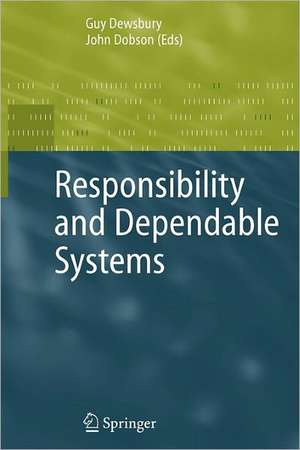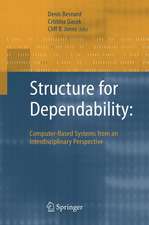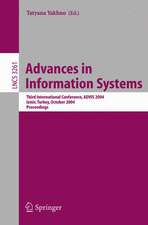Responsibility and Dependable Systems
Editat de Guy Dewsbury, John Dobsonen Limba Engleză Paperback – 13 oct 2010
Organisational responsibility is examined from philosophical, social and practical viewpoints, which then leads to a workflow design which supports those responsibilities. The approach pays particular attention to looking at what happens when things go wrong and the adjustments and workarounds that people make to fulfil their responsibilities when their primary operational tasks are unachievable or frustrated, and how these alternative strategies can be incorporated into the workflow design. The application of the method to multi-organisational contexts is dealt with in some detail.
| Toate formatele și edițiile | Preț | Express |
|---|---|---|
| Paperback (1) | 643.50 lei 6-8 săpt. | |
| SPRINGER LONDON – 13 oct 2010 | 643.50 lei 6-8 săpt. | |
| Hardback (1) | 649.75 lei 6-8 săpt. | |
| SPRINGER LONDON – 23 apr 2007 | 649.75 lei 6-8 săpt. |
Preț: 643.50 lei
Preț vechi: 804.37 lei
-20% Nou
Puncte Express: 965
Preț estimativ în valută:
123.14€ • 128.82$ • 102.29£
123.14€ • 128.82$ • 102.29£
Carte tipărită la comandă
Livrare economică 02-16 aprilie
Preluare comenzi: 021 569.72.76
Specificații
ISBN-13: 9781849966313
ISBN-10: 1849966311
Pagini: 229
Ilustrații: XV, 229 p.
Dimensiuni: 155 x 235 x 14 mm
Greutate: 0.36 kg
Ediția:Softcover reprint of hardcover 1st ed. 2007
Editura: SPRINGER LONDON
Colecția Springer
Locul publicării:London, United Kingdom
ISBN-10: 1849966311
Pagini: 229
Ilustrații: XV, 229 p.
Dimensiuni: 155 x 235 x 14 mm
Greutate: 0.36 kg
Ediția:Softcover reprint of hardcover 1st ed. 2007
Editura: SPRINGER LONDON
Colecția Springer
Locul publicării:London, United Kingdom
Public țintă
ResearchCuprins
Introduction: Dependability and Responsibility in Context.- Introduction: Dependability and Responsibility in Context.- Philosophical and Social Aspects.- Responsibility: A Philosophical Perspective.- Responsibility in Practice.- Complex Organisational Responsibilities: The Ladbroke Grove Rail Inquiry.- Modelling.- Responsibility Modelling: Basic Concepts.- Models for Understanding Responsibilities.- Understanding Failure: The London Ambulance Service Disaster.- New Methods.- Models for Responsibility Assignment.- Causal Responsibility Models.- Modelling in Practice.
Recenzii
From the reviews:
"Unique consideration of social and human factors in designing responsibility and dependability into complex systems makes this treatise appropriate for system engineers, social scientists, and graduate students. … Responsibility modeling is discussed in detail, and useful tools are presented for the analysis and technical design of complex systems. … The book is an appropriate length, and contains a good index and list of references … . I recommend this book … ." (Brad Reid, Computing Reviews, January, 2008)
"Unique consideration of social and human factors in designing responsibility and dependability into complex systems makes this treatise appropriate for system engineers, social scientists, and graduate students. … Responsibility modeling is discussed in detail, and useful tools are presented for the analysis and technical design of complex systems. … The book is an appropriate length, and contains a good index and list of references … . I recommend this book … ." (Brad Reid, Computing Reviews, January, 2008)
Textul de pe ultima copertă
It is a truism that ‘human error’ is a common reason for failure in complex systems. These ‘errors’ sometimes lead to system failures because designers have failed to consider the normal human tendency to make mistakes. In other cases, ‘errors’ arise because of misunderstandings of who is responsible for what and how these responsibilities are to be discharged. Responsibility failures lead directly to actions that result in system failure.
Responsibility and Dependable Systems is the first book to examine the relationship between responsibility and system dependability. Both editors have backgrounds in computing and social science giving them a unique insight into how responsibility influences system dependability in different environments.
Divided into three parts, the first considers the philosophical and social aspects of responsibility, revisiting socially oriented system failures from a social, ethnographic perspective to tease out the complexities of the responsibilities that were implicated in the failure. Part Two uses a series of simple modelling notations to consider responsibility from a process and role-oriented perspective, using ideas from computer science, social science, management theory and engineering. The final section introduces new methods for analysing responsibility and mapping responsibilities within an organisation. The methods are illustrated by annotated models that can be adapted for use in both analysing and preventing failures of responsibility.
Systems engineers, computer scientists, social scientists, ergonomists and management researchers will all benefit from reading the book, and professionals and practitioners making organisational decisions concerning dependable human-computer systems, will also find it of value.
Responsibility and Dependable Systems is the first book to examine the relationship between responsibility and system dependability. Both editors have backgrounds in computing and social science giving them a unique insight into how responsibility influences system dependability in different environments.
Divided into three parts, the first considers the philosophical and social aspects of responsibility, revisiting socially oriented system failures from a social, ethnographic perspective to tease out the complexities of the responsibilities that were implicated in the failure. Part Two uses a series of simple modelling notations to consider responsibility from a process and role-oriented perspective, using ideas from computer science, social science, management theory and engineering. The final section introduces new methods for analysing responsibility and mapping responsibilities within an organisation. The methods are illustrated by annotated models that can be adapted for use in both analysing and preventing failures of responsibility.
Systems engineers, computer scientists, social scientists, ergonomists and management researchers will all benefit from reading the book, and professionals and practitioners making organisational decisions concerning dependable human-computer systems, will also find it of value.
Caracteristici
Explores the social and technical aspects of dependability and responsibility



























